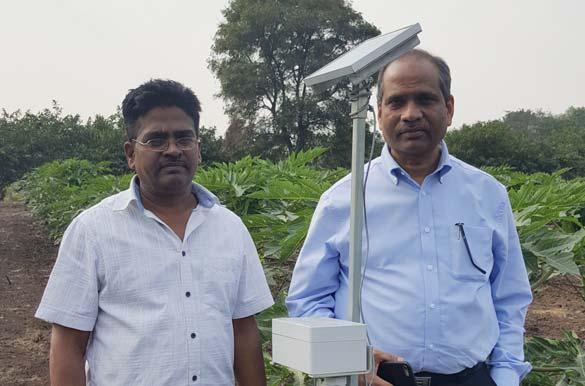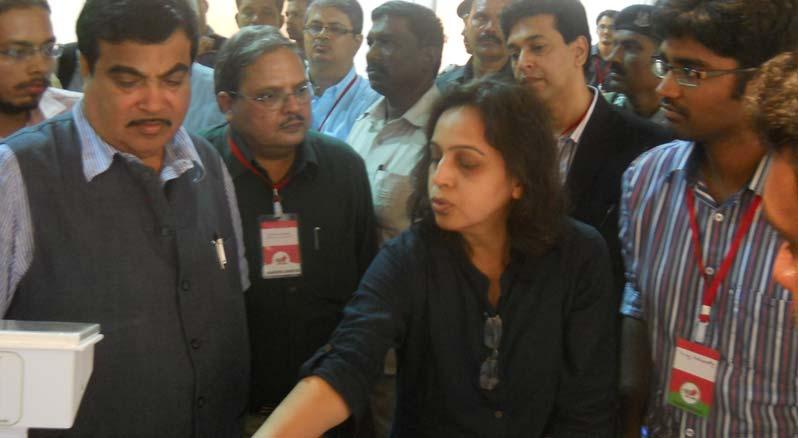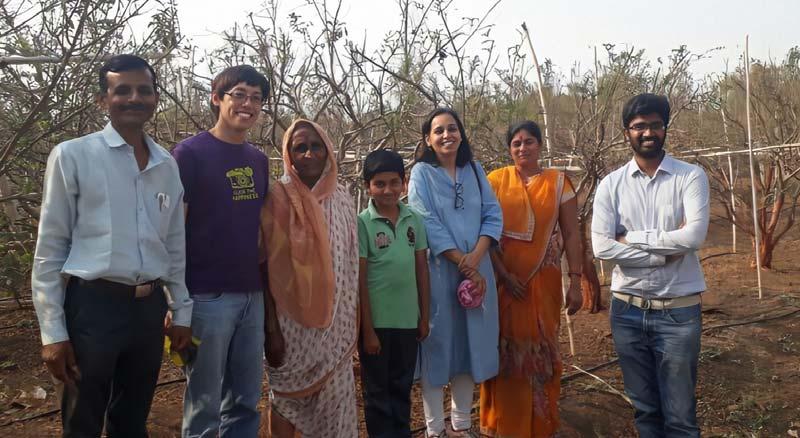
4 minute read
Sensing Soil Needs
By JASON CHIANG
Millennium Alliance awardee Proximal SoilSens has developed a low-cost smart soil monitoring system that can help farmers irrigate their land more accurately and sustainably.
Advertisement
For farmers, there is hardly anything more important than the quality and sustainability of the land they cultivate. Proper irrigation is crucial to maintaining soil moisture and health. This aspect, however, is being adversely affected by climate change. According to recent studies, India’s agricultural sector uses about 80 percent of the available water in the country, but almost 40 percent of this water gets wasted due to inefficient irrigation practices.
Proximal SoilSens has found a solution. The Maharashtra-based start-up, co-founded by Indian Institute of Technology (IIT) Bombay students and professors, has developed a lowcost smart soil monitoring system that can help farmers irrigate their fields more accurately and sustainably. The company’s ultimate goal is to make the agriculture sector more profitable and sustainable by improving crop production and saving water.

Senior Scientist R. N. Sahoo (right) and G. K. Mahapatro, head of Indian Council of Agricultural Research - Indian Agricultural Research Institute Regional Station in Pune, with a SoilSens system.
Courtesy Proximal SoilSens
Sensors for agricultural uses are particularly hard to develop because they need to be highly accurate and specific for the job, while also being rugged enough to function in extreme weather conditions. These features are essential for farmers, who often do not have access to accurate weather forecasts and farm-specific field data, which are necessary to manage critical agricultural activities like sowing, irrigation, pesticide application and harvesting.
Rajul Patkar, co-founder of Proximal SoilSens, began envisioning low-cost sensor devices for point-of-care applications in agriculture while she was a Ph.D. student in 2011 at IITBombay. “After some research, I figured out that two significant hindrances were the cost of the product and the mindset of the people,” says Patkar. “After realizing this, my first and foremost challenge was to bring down the cost of the technology and, second, design the product geared toward Indian farmers.”
Patkar teamed up with three other Ph.D. students and a professor to form Proximal SoilSens in 2017. The start-up was incubated at IIT Bombay, with support from the Department of Science and Technology and the Ministry of Electronics and Information Technology of the Government of India. The start-up has also won a grant from Millennium Alliance, a consortium of partners including the Government of India, the United States Agency for International Development (USAID) and others. Millennium Alliance provides funding, capacity building and business development support to Indian social enterprises.

Rajul Patkar (center) describes SoilSens products to Nitin Gadkari, minister of road transport and highways; and micro, small and medium enterprises, Government of India, at the Global Business Forum in Goa.
Courtesy Proximal SoilSens
Since its launch, SoilSens has developed a range of products to help farmers access affordable technologies for advanced precision farming. SoilSens’ tools can provide sensor-based solutions for controlled irrigation and allow farmers to receive irrigation alerts automatically on their phones. Its other solutions enable farmers to control irrigation motors and pumps automatically with just a click on their mobile device.
Excerpts from an interview with Patkar.
In your opinion, how important are collaborative efforts in your field of work?
The forerunner to success as a company is collaboration and perseverance. We, at Proximal SoilSens, believe in the idea of strong collaborations and have partnered with a few companies in the agro domain, which specialize in complementary skill sets. Our beliefs stem from the fact that good soil, optimum water and timely weather advisories are three of the most important things a farmer needs to enhance productivity, along with quality seeds and fertilizer. Excellent storage facilities and market linkages are final important steps in converting a farmer’s produce into income. They need assistance at various levels, and this is why SoilSens thinks that Indian farmers need the technology and platforms at very affordable costs and with a lot of support and handholding.
Do you have any updates on recent trials and results of yourtechnology?
Proximal SoilSens has worked with the corporate sector, farmers, agri-produce organizations and research scientists to show the benefits of its technology in agriculture. We have done pilot studies across various types of soils and crops, and have seen that the efficiency of water usage improved by 27 percent. It was also noted that the yield of certain crops has gone up, like 7.5 percent in green gram and 20 percent in potato. This improved productivity, coupled with alerts and notifications about diseases and weather, can take the reliability and usability of our systems further.

Proximal SoilSens team members with farmers in Shirdi, Maharashtra.
Courtesy Proximal SoilSens
What are Proximal SoilSens’goals for the future and do you have anything exciting in the pipeline?
Our vision has always been directed toward making precision agricultural technologies affordable for point-of-care applications. Keeping that in mind, we have designed and patented a moisture meter, which is both smart and extremely affordable, at a cost price that is below $100, thus hoping for widespread adoption by marginal farmers. Currently, we are in the process of promoting this technology, by working with FPOs [farmer producer organizations]. As the name of our company suggests, we are developing a portable platform for soil nutrient analysis that can be used in “proximity to the farm.” We will be ready for field trials in the next six months.
Jason Chiang is a freelance writer based in Silver Lake, Los Angeles.










